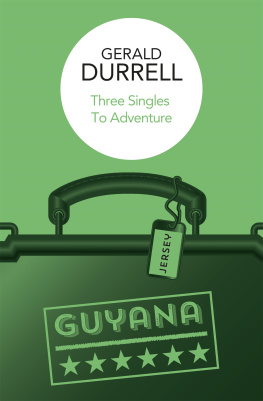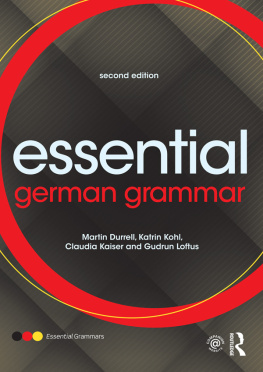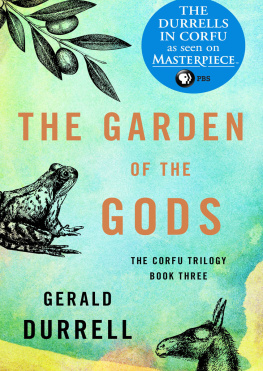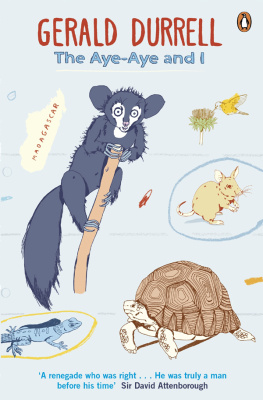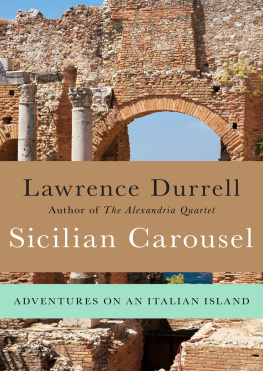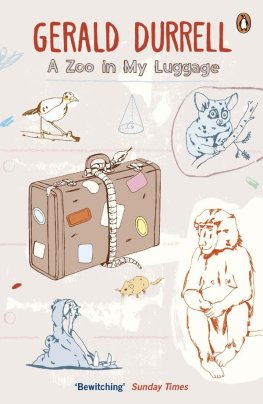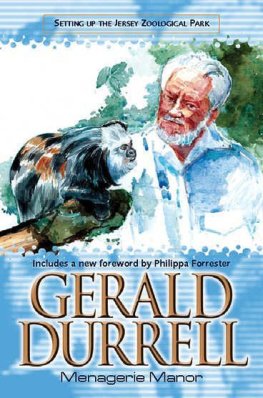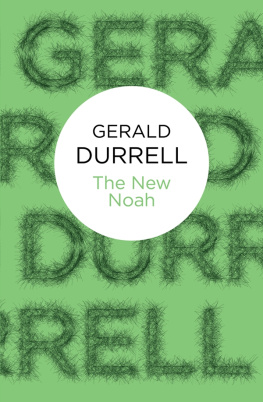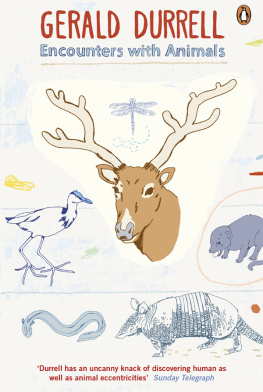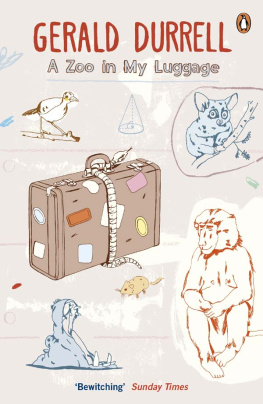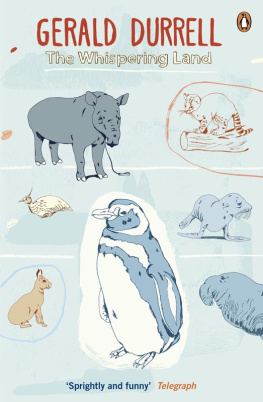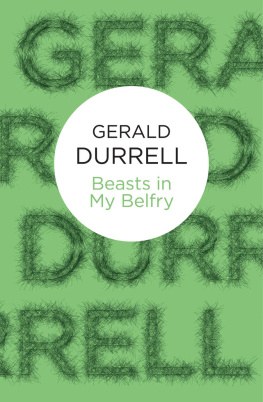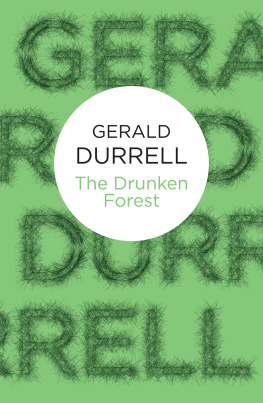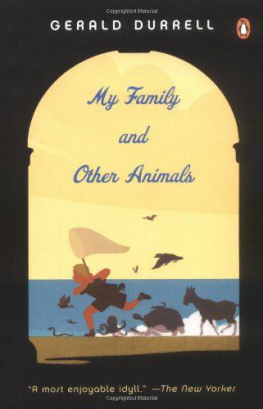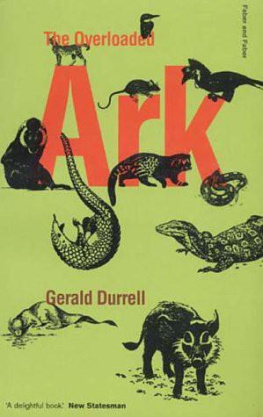Bello:
hidden talent rediscovered!
Bello is a digital only imprint of Pan Macmillan, established to breathe new life into previously published, classic books.
At Bello we believe in the timeless power of the imagination, of good story, narrative and entertainment and we want to use digital technology to ensure that many more readers can enjoy these books into the future.
We publish in ebook and Print on Demand formats to bring these wonderful books to new audiences.
About Bello:
www.panmacmillan.com/imprints/bello
About the author:
www.panmacmillan.com/author/geralddurrell

By Gerald Durrell
My Family and Other Animals
A Zoo in My Luggage
Birds, Beats and Relatives
Garden of the Gods
The Overloaded Ark
The Talking Parcel
The Mockery Bird
The Donkey Rustlers
Catch me A Colobus
Beasts In My Belfry
The New Noah
The Drunken Forest
The Whispering Land
Rosy is My Relative
Two in the Bush
Three Singles to Adventure
The Arks Anniversary
Golden Bats and Pink Pigeons
Menagerie Manor
The Picnic and Suchlike Pandemonium
The Bafut Beagles
Marrying off Mother and Other Stories
The Aye-Aye And I
Fillets of Plaice
Ark on the Move
Encounters with Animals
The Stationary Ark
This is for
ROBERT LOWES
In memory of Snakes,
Sloths, and South American Saddles
Contents
A Word in Advance
The following book is an account of a trip I made to British Guiana during 1950 with my partner, Kenneth Smith. Our object in going there was to bring back, for various zoological gardens in this country, a living collection of the birds, mammals, reptiles and fish that inhabit that corner of South America.
A lot of people are under the mistaken impression that the catching of the animals is the most difficult part of such a trip, and that once the beasts have been caught and dumped into boxes your job is more or less at an end. Actually, at this point the job is only just beginning, for once the animal is caught you have to keep it alive and well, and this, in most cases, is no easy task.
During a trip of this sort you meet with many kinds of adventure, some amusing, some thrilling and some that are extremely irritating. But these are merely the highlights in many months of work and worry that go to make up a collecting trip. However, when you sit down to write a book about it, all the worries, irritations and disappointments seem to fade from your memory, leaving only the more entertaining moments to be recorded. Thus you tend to paint a false picture of collecting. It seems to be nothing more than a thrilling and amusing romp, a rather colourful and exciting sort of job. It is, at times, all of these things; but at other times it is also depressing, disappointing, frustrating and damned hard work as well. But there is one thing to be said for collecting, one advantage it has over all other forms of employment: it can never, under any circumstances, be described as dull .
Acknowledgements
While we were in Guiana so many people helped us in such a variety of ways that it is impossible to thank them all. I would, however, like to mention the following people, to whom we owe a very great debt of gratitude.
Mr and Mrs Charles Dowding, of Georgetown, allowed us to live in their beautiful house, fill their garden with our weird collection of animals, and helped and encouraged us in every possible way. They showed us kindness that is, unfortunately, all too rare nowadays. It is impossible for us to thank them adequately for all they did for us.
Mr Vincent Roth, Curator of the British Guiana Museum and his Assistant, Mr Ram Singh, were both very kind to us, and without their help and advice we could have accomplished little. Mr Singh was particularly helpful in identifying various specimens of the fauna we collected, and was always ready to place at our disposal his considerable knowledge of the bird life of the territory. Mr and Mrs McTurk, of Karanambo, deserve our special thanks, for putting up both Robert Lowes and myself when we arrived in the Rupununi, and for helping us to obtain so many fine specimens. We are very grateful to all those members of Booker Brothers, in Guiana, who helped us to obtain passages for ourselves and our animals, and who arranged for our stores of food for the voyage. I would also like to thank the Captain and crew of the ship I travelled home on, who went out of their way to make my voyage as easy as possible.
Prelude
In a tiny bar in the back streets of Georgetown four of us sat round a table, sipping rum and ginger beer and pondering a problem. Spread on the table in front of us was a large map of Guiana, and occasionally one of us would lean forward and peer at it, frowning fiercely. Our problem was to choose a place, out of all the fascinating names on the map, to serve as a base for our first animal-collecting trip to the interior. For two hours we had been trying to make up our minds, and we still had not found a solution. I stared at the map, tracing the course of the rivers and mountains, gloating over such wonderful names as Pomeroon, Mazaruni, Kanuku, Berbice, and Essequibo.
What about New Amsterdam? asked Smith, choosing the one really commonplace name on the map.
I shuddered, Bob shook his head, and Ivan looked blank. Well, then, what about the Mazaruni?
Flooded, said Bob concisely.
Guiana, I quoted ecstatically from a guidebook, is an Amerindian word meaning Land of Water.
There must be somewhere you can go, said Smith in exasperation; weve been sitting here for hours; for goodness sake make up your minds, and lets get to bed.
I looked at Ivan; for the last hour he had apparently been in a trance, and had made no suggestions.
What do you think, Ivan? I asked him. After all, you were born here, so you ought to know the best place to get specimens.
Ivan awoke from his trance, and a worried expression spread across his face, making him look like a St Bernard that had mislaid its barrel.
Well, sir, he began, in his incredibly cultured voice, I think youd do well if you went to Adventure.
Where ? asked Bob and I in unison.
Adventure, sir, he stabbed at the map; its a small village just here, near the mouth of the Essequibo.
I looked at Smith.
Were going to Adventure, I said firmly. I must go to a place with a name like that.
Good! said my partner. Now thats settled can we go to bed?
He has no soul, said Bob sorrowfully; the word Adventure means nothing to him.
To get to this village with the provocative name proved easier than I had anticipated. It transpired that all we had to do was to go down to the quay in Georgetown and ask for a ticket. It struck me as a trifle incongruous, even in these modern days, to be able to ask for a ticket to Adventure and, moreover, to start ones journey there on a large and ugly ferryboat. I felt that we should have set off in canoes paddled by fierce-looking warriors.
However, bright and early one morning a taxi deposited Bob, Ivan, myself, and our odd assortment of luggage on the quay. Leaving my companions to argue with the driver over the correct fare, I walked up to the booking office and uttered the magic words.
Three singles to Adventure, please, I said, trying to look as nonchalant as possible.
Yes , sir, said the clerk. First or second class?
This was almost too much for me; it was bad enough, I felt, to be able to ask for tickets to Adventure, but when it came down to a question of first or second class I began to wonder if the place was worth going to. We would probably find it was a thriving seaside resort, with cinemas, snack bars, neon lights, and other doubtful privileges of civilisation. Turning round, I saw Ivan staggering along under a great load of our possessions, and I called him over to settle this apparently delicate question of class. He explained that if one travelled second-class one was herded somewhere down in the bilges of the ferry and, later on, in the bilges of the river steamer. A first-class ticket, however, gave you the privilege of sitting on a dilapidated deckchair on the top deck of the ferry, and on the river steamer you could even get lunch. So I purchased three first-class single tickets to Adventure.
Next page
